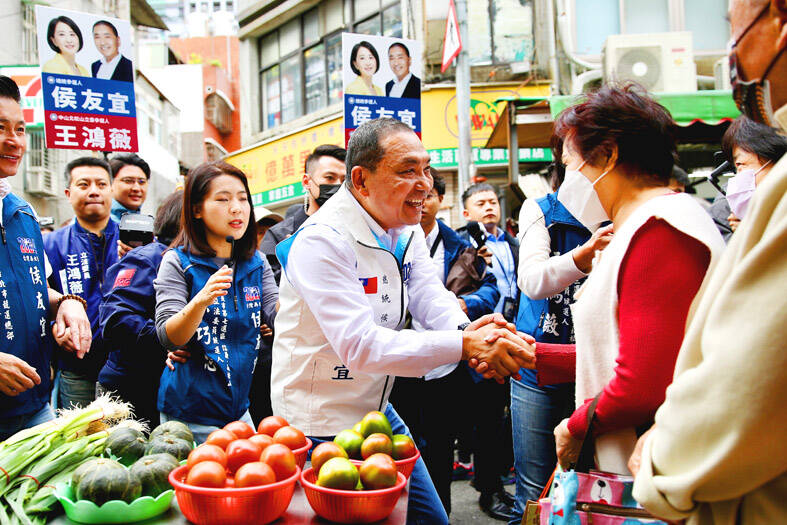The Chinese Nationalist Party’s (KMT) presidential candidate, New Taipei City Mayor Hou You-yi (侯友宜), yesterday pledged to increase the subsidy for private university students’ tuition and miscellaneous fees to NT$50,000 (US$1,599) if elected.
The average tuition at public universities is about NT$62,000 per year, while that of private universities is about NT$110,000 — a gap of almost NT$50,000, the Ministry of Education said.
In June, Vice President William Lai (賴清德), the Democratic Progressive Party’s presidential candidate, said that the government would give students at private universities a subsidy equal to “at least half” of the gap between public and private university tuition fees, or about NT$25,000 per year.

Photo: EPA-EFE, Ritchie B. Tongo
Hou yesterday also proposed an interest-free loan for students.
Citing statistics from the Ministry of Labor saying that one-quarter of the nation’s college graduates earn the minimum wage as a starting salary, Hou asked how young people could be expected to make ends meet.
Nearly 80 percent of students at private universities — three times more than those at national universities — face paying off a student loan, he said.
Student loans might last from eight years to as many as 14 years, a large burden on young people, he said.
Earlier in the week, Hou pledged to allocate NT$10 billion to raise the starting salary for voluntary troops to give people an incentive people to serve in the armed forces.
The money would be spent on increasing the salary of military personnel by NT$10,000 per month, in particular those serving on the front lines and in combat units, which have a personnel shortage, he said.
Another main reason young Taiwanese are reluctant to serve in the military is that most Taiwanese respect military personnel far less than in other countries, Hou said.
If he becomes president, he would make Armed Forces Day on Sept. 3 a public holiday and rename it “Showing Respect to the Armed Forces Day,” so that military personnel receive the respect they deserve, he said.

US climber Alex Honnold is to attempt to scale Taipei 101 without a rope and harness in a live Netflix special on Jan. 24, the streaming platform announced on Wednesday. Accounting for the time difference, the two-hour broadcast of Honnold’s climb, called Skyscraper Live, is to air on Jan. 23 in the US, Netflix said in a statement. Honnold, 40, was the first person ever to free solo climb the 900m El Capitan rock formation in Yosemite National Park — a feat that was recorded and later made into the 2018 documentary film Free Solo. Netflix previewed Skyscraper Live in October, after videos

NUMBERS IMBALANCE: More than 4 million Taiwanese have visited China this year, while only about half a million Chinese have visited here Beijing has yet to respond to Taiwan’s requests for negotiation over matters related to the recovery of cross-strait tourism, the Tourism Administration said yesterday. Taiwan’s tourism authority issued the statement after Chinese-language daily the China Times reported yesterday that the government’s policy of banning group tours to China does not stop Taiwanese from visiting the country. As of October, more than 4.2 million had traveled to China this year, exceeding last year. Beijing estimated the number of Taiwanese tourists in China could reach 4.5 million this year. By contrast, only 500,000 Chinese tourists are expected in Taiwan, the report said. The report

Temperatures are forecast to drop steadily as a continental cold air mass moves across Taiwan, with some areas also likely to see heavy rainfall, the Central Weather Administration (CWA) said. From today through early tomorrow, a cold air mass would keep temperatures low across central and northern Taiwan, and the eastern half of Taiwan proper, with isolated brief showers forecast along Keelung’s north coast, Taipei and New Taipei City’s mountainous areas and eastern Taiwan, it said. Lows of 11°C to 15°C are forecast in central and northern Taiwan, Yilan County, and the outlying Kinmen and Lienchiang (Matsu) counties, and 14°C to 17°C

STEERING FAILURE: The first boat of its class is experiencing teething issues as it readies for acceptance by the navy, according to a recent story about rudder failure The Hai Kun (海鯤), the nation’s first locally built submarine, allegedly suffered a total failure of stern hydraulic systems during the second round of sea acceptance trials on June 26, and sailors were forced to manually operate the X-rudder to turn the submarine and return to port, news Web site Mirror Daily reported yesterday. The report said that tugboats following the Hai Kun assisted the submarine in avoiding collisions with other ships due to the X-rudder malfunctioning. At the time of the report, the submarine had completed its trials and was scheduled to begin diving and surfacing tests in shallow areas. The X-rudder,